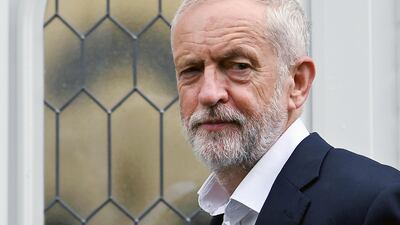Boris Johnson declared his efforts to leave the European Union had been fatally undermined by a parliamentary revolt on Wednesday as he demanded a general election to secure a fresh mandate.
The British prime minister faced a roadblock to his plans after the opposition Labour Party confirmed they would vote down the move and instead prioritise legistlative efforts to prevent a no-deal Brexit on October 31.
A spokesman said the country was in an intolerable position of weakness as it tried to talk to its European counterparts. "The prime minister, while not wanting an election, believes that if his negotiating position has been destroyed then that should be tested at an election and the public should be able to decide on the next steps forward," the Downing St official said.
While Jeremy Corbyn, Labour's leftist leader, has been calling for an early poll for months, he said it would only support an election if parliament managed to block a no-deal Brexit first.
Labour’s Brexit spokesman Sir Keir Starmer on Wednesday described Mr Johnson’s election plans as a “trap” to push through a no-deal exit.
"We're not shy of a general election but we're not going to be taken in by what Boris Johnson says, because we do not trust him," he said.
The UK has what is known as fixed-term parliaments, meaning elections take place every five years.
To hold an early election, Mr Johnson would need the support of two-thirds of 650 MPs from the House of Commons and on Wednesday night the government forced a vote on going to the country.
His spokesman said an election should take place before a formal meeting of EU leaders on October 17. UK media reported on Wednesday that the proposed election date was likely to be October 15.
An argument within the opposition ranks centres on the possibility of agreeing to the election after the rebel bill has been passed and the October 31 deadline is safely passed. John McDonnell, Labour's influential finance spokesman, said the option remained on the table if concessions on timing can be obtained.
“We want to get the legislation secure, with royal assent, but we’re also not going to be tricked or conned, so we’re looking at every way in which, having secured the legislation, he can’t wriggle out of abiding by the law and implementing it,” he said. “At the moment there’s nothing that Johnson has done in recent weeks that gives us the confidence that he’s going to abide by the law.”
Mr Johnson threatened the move after the government lost a parliamentary vote on Tuesday evening, which paves the way for parliamentarians to bring a bill forward to block the UK leaving the EU without a divorce deal.
The MPs again backed the bill on Wednesday, as it clear procedural hurdles. It proposes to delay Brexit until January 31 if the prime minister can’t agree a deal with Brussels in a bid to thwart Mr Johnson’s “do or die” plans to take the UK out of the EU.
Twenty-one Conservative MPs had the party whip withdrawn after they supported the opposition's bid to block no-deal. The contingent boast more than 300 years of parliamentary experience and won't immediately lose their seat. That would have to happen at the election when hey cannot stand for their party.
But as they are booted out of their party, the 21 are now technically independent MPs, but they can be reinstated if the leadership "restores the whip".
Ken Clarke, former chancellor of the exchequer, said: “This leader, I don’t recognise this. It’s the Brexit Party, rebadged…the most right-wing cabinet any Conservative Party has ever produced. They’re not in control of events.”
Nicholas Soames, another rebel, spoke of his sadness at the blow dealt near the end of his career. He referenced the prior rebellions of those now leading the government, sarcastically thanking the "prime minister, the leader of the house, and other members of the cabinet whose serial disloyalty has been such an inspiration to so many of us."
Anger was targeted at Dominic Cummings, the prime minister's controversial chief of staff who has orchestrated the strategy of confrontation with rebels. He was said to have berated and insulted the rebels in private meetings before the votes on Tuesday. "He is ruthless, he couldn’t care less whether we got a deal or whether we didn’t and he rules with a rod of iron," said Margot James, one of those expelled. "It's high time his wings are clipped."
Rory Stewart, former international development minister, got the news that the whip had been withdrawn from him via text message.
"This is not a Conservative way of behaving," he added.
Former justice minister David Gauke described his rebellion as "probably not a good career move but the right choice".

